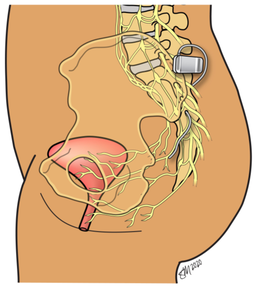Sacral neuromodulation (SNM)
|
Sacral Neuromodulation (SNM) is indicated for people with urinary retention, overactive bladder with or without urgency urinary incontinence, and anal incontinence/accidental bowel leakage. SNM involves the implantation of a device about the size of a stopwatch that sends mild electrical signals to a nerve (the sacral nerve) located just above the tail bone. This nerve controls muscles and other nerves that impact urinary and bowel control.
How Does SNM Work?
SNM sends electrical pulses to the nerves that control the bladder and bowels and helps the bladder and bowels send signals to the brain. As a result of these electrical impulses, SNM can improve bladder and bowel control problems. How Is SNM Performed? A small device, called the stimulator, is placed underneath the skin near the back of your hip. This stimulator is then connected to a wire located near the nerves that control your bladder and bowel and delivers electrical pulses. You can control the stimulator, that is, change the level of electrical impulses or turn the stimulator on and off, using a hand-held remote control device. Before you undergo SNM, you will be asked to complete a baseline bladder and/or bowel diary. This provides you and your urogynecologist with valuable information about how your bladder and/or bowel function before treatment. SNM is performed in two stages. The first stage is called the “test phase” and allows us to see if the therapy will work for you. This stage, begins with the implantation of the wire near the nerve that controls your bladder and bowels. The wire is connected to a temporary, external stimulator and we see how your bladder and/bowel symptoms change with stimulation. If your symptoms improve during this test stage, then we will proceed to the second stage which involves the placement of a permanent, internal stimulator device.
*If you do not have a satisfactory response to the therapy during the test phase, your urogynecologist will remove the lead in the operating room. How Long Will SNM Last? Depending on the type of SNM your urogynecologist chooses, your device will last 5–15 years and likely will be rechargeable. Most times, the implanted wire does not need to be adjusted. Occasionally, however, women fall or have an accident, which might affect the placement of the wire. If you experience a fall or an accident, please notify your urogynecologist. What Are the Potential Risks Associated with SNM? As with any surgical procedure, problems can occur with SNM placement. Although rare, some risks include infection, pain, and lead movement. SNM can always be removed if necessary. If you notice a bothersome change in your bladder or bowel symptoms, please let your urogynecologist know as these problems may be resolved with the reprogramming of the system. Medications or surgery may also be indicated in this case. And if at any time your SNM device needs to be removed, it is a straightforward procedure that is performed in the operating room. If you have an SNM device, be careful with MRI (magnetic resonance imaging) studies. Consult the clinician who implanted the device or the device manufacturer if you need to have an MRI. Many women find that treatments such as medications, behavior modification, diet changes, pelvic floor exercises, or the use of a catheter to empty the bladder do not adequately treat their symptoms or cause side effects. SNM is an excellent option for women who have not had adequate symptom control with other therapies. You will need to fill out a bladder or bowel diary before and during the test phase (your urogynecologist will give this to you). It is very important that you fill out this diary as honestly and completely as you can since the information in your diary will help guide your treatment. Before your scheduled surgery date, you will receive specific instructions on how to prepare for the procedures. |
To Request an Appointment
If you're suffering from a pelvic floor disorder, you don't have to live with the symptoms. To learn about treatment options, call 312.694.7337 to schedule an appointment with one of our urogynecologists. |




